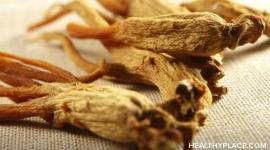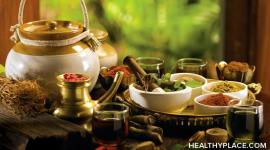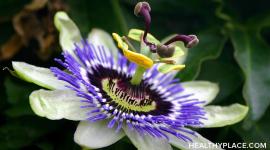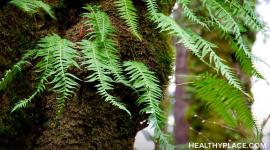Ginkgo Biloba
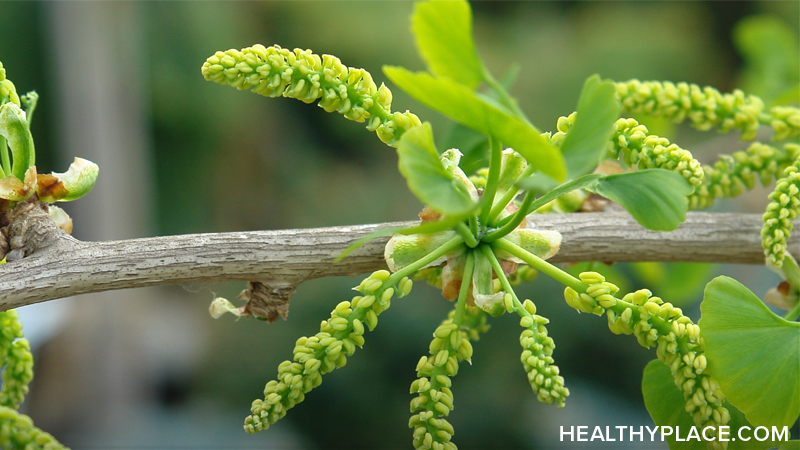
Ginkgo Biloba is an herbal remedy for treating alzheimer's disease and dementia, memory problems and depression. Learn about the usage, dosage, side-effects of Ginkgo Biloba.
Botanical Name:Ginkgo biloba
Common Names:Maidenhair tree
- Overview
- Plant Description
- What's It Made Of?
- Available Forms
- How to Take It
- Precautions
- Possible Interactions
- Supporting Research
Overview
Ginkgo (Ginkgo biloba) is one of the oldest living tree species and its leaves are among the most extensively studied botanicals in use today. Unlike many other medicinal herbs, ginkgo leaves are not frequently used in their crude state, but rather, in the form of a concentrated, standardized ginkgo biloba extract (GBE). In Europe, GBE is among the best-selling herbal medications and it ranks within the top five of all prescriptions written in France and Germany.
Ginkgo has been used in traditional medicine to treat circulatory disorders and enhance memory. Scientific studies throughout the years lend support to these traditional uses. Emerging evidence suggests that GBE may be particularly effective in treating ailments associated with decreased blood flow to the brain, particularly in elderly individuals. Laboratory studies have shown that GBE improves blood circulation by dilating blood vessels and reducing the stickiness of blood platelets.
Ginkgo leaves also contain two types of chemicals (flavonoids and terpenoids) believed to have potent antioxidant properties. Antioxidants are substances that scavenge free radicals -- damaging compounds in the body that alter cell membranes, tamper with DNA, and even cause cell death. Free radicals occur naturally in the body, but environmental toxins (including ultraviolet light, radiation, cigarette smoking, and air pollution) can also increase the number of these damaging particles. Free radicals are believed to contribute to a number of health problems including heart disease and cancer as well as Alzheimer's disease and other forms of dementia. Antioxidants such as those found in ginkgo can neutralize free radicals and may reduce or even help prevent some of the damage they cause.
Based on studies conducted in laboratories, animals, and humans, professional herbalists may recommend ginkgo for the following health problems:
Ginkgo for Alzheimer's Disease and Dementia
Ginkgo is widely used in Europe for treating dementia. The reason that ginkgo is thought to be helpful for preventing or treating these brain disorders is because it improves blood flow in the brain and because of its antioxidant properties. Although many of the clinical trials have been scientifically flawed, the evidence that ginkgo may improve thinking, learning, and memory in people with Alzheimer's disease (AD) has been highly promising.
Clinical studies suggest that ginkgo provides the following benefits for people with AD:
- Improvement in thinking, learning, and memory
- Improvement in activities of daily living
- Improvement in social behavior
- Fewer feelings of depression
One recent study also found that ginkgo may be as effective as leading AD medications in delaying the symptoms of dementia in people with this debilitating condition. In addition, ginkgo is sometimes used preventively because it may delay the onset of AD in someone who is at risk for this type of dementia (for example, family history).
Eye problems
The flavonoids found in ginkgo may help halt or lessen some retinal problems (that is, problems to the back part of the eye). Retinal damage has a number of potential causes, including diabetes and macular degeneration. Macular degeneration (often called age-related macular degeneration or ARMD) is a progressive, degenerative eye disease that tends to affect older adults and is the number one cause of blindness in the United States. Studies suggest that ginkgo may help preserve vision in those with ARMD.
Intermittent Claudication
Because ginkgo is reputed to improve blood flow, this herb has been studied in people with intermittent claudication (pain caused by inadequate blood flow [atherosclerosis] to the legs). People with intermittent claudication have difficulty walking without suffering extreme pain. An analysis of eight published studies revealed that people taking ginkgo tend to walk roughly 34 meters farther than those taking placebo. In fact, ginkgo has been shown to be as effective as a leading medication in improving pain-free walking distance. However, regular walking exercises are more beneficial than ginkgo in improving walking distance.
Memory Impairment
Ginkgo is widely touted as a "brain herb" and is commonly added to nutrition bars and fruit smoothies to boost memory and enhance cognitive performance. Researchers recently reviewed all of the high-quality published studies on ginkgo and mild memory impairment (in other words, people without Alzheimer's or other form of dementia), and concluded that ginkgo was significantly more effective than placebo in enhancing memory and cognitive function. Despite the encouraging findings, some researchers speculate that more high-quality research, involving larger numbers of people, is needed before ginkgo can be recommended as a memory enhancer to otherwise healthy adults.
Tinnitus
Given that nerve damage and certain blood vessel disorders can lead to tinnitus (the perception of ringing, hissing, or other sound in the ears or head when no external sound is present), some researchers have investigated whether ginkgo relieves symptoms of this hearing disorder. Although the quality of most studies was poor, the reviewers concluded that ginkgo moderately relieves the loudness of the tinnitus sound. However, a recent well-designed study including 1,121 people with tinnitus found that ginkgo (given 3 times daily for 3 months) was no more effective than placebo in relieving symptoms of tinnitus. Given these conflicting findings, the therapeutic value of ginkgo for tinnitus remains uncertain. In general, tinnitus is a very difficult problem to treat. Talk to your doctor about whether a trial of ginkgo to alleviate this frustrating symptom may be safe and worthwhile for you.
Other Uses including Ginkgo for Depression
In addition to these health problems, professional herbalists may also recommend ginkgo for a variety of other ailments including altitude sickness, asthma, depression, disorientation, headaches, high blood pressure, erectile dysfunction, and vertigo.
Plant Description
Ginkgo biloba is the oldest living tree species. A single tree can live as long as 1,000 years and grow to a height of 120 feet. It has short branches with fan-shaped leaves and inedible fruits that produce a strong odor. The fruit contains an edible inner seed.
Although Chinese herbal medicine has used both the ginkgo leaf and seed for centuries, modern research has focused on the standardized Ginkgo biloba extract (GBE), which is prepared from the dried green leaves. This extract is highly concentrated and much more effective in treating health problems (particularly circulatory ailments) than the leaf alone.
What's It Made Of?
More than 40 components of ginkgo have been identified but only two are believed to be responsible for the herb's beneficial effects -- flavonoids and terpenoids. As described earlier, flavonoids (such as quercetin) have potent antioxidant effects. Laboratory and animal studies have shown that flavonoids protect the nerves, heart muscle, and retina from damage. Terpenoids (such as ginkgolides) improve blood flow by dilating blood vessels and reducing the stickiness of platelets.
Available Forms
- Ginkgo biloba extract (GBE) standardized to contain 24% flavonoids and 6% terpenoids
- Capsules
- Tablets
- Tictures
How to Take It
Pediatric
There are no known scientific reports on the pediatric use of ginkgo. Therefore, it is not currently recommended for children.
Adult
- Initial results often take 4 to 6 weeks, but should continue to accumulate beyond that period. You may not see any dramatic changes for six months.
- GBE: 120 mg daily in two or three divided doses of 50:1 extract standardized to 24% flavone glycosides (flavonoids). If more serious dementia or Alzheimer's disease is present, up to 240 mg daily in two or three divided doses may be necessary.
- Tincture (1:5): 2 to 4 mL three times a day
Precautions
The use of herbs is a time-honored approach to strengthening the body and treating disease. Herbs, however, contain active substances that can trigger side effects and interact with other herbs, supplements, or medications. For these reasons, herbs should be taken with care, under the supervision of a practitioner knowledgeable in the field of botanical medicine.
GBE is considered to be safe and side effects are rare. In a few cases, gastrointestinal upset, headaches, skin reactions, and dizziness were reported.
Because gingko decreases platelet aggregation (stickiness), there is some concern that it may increase risk of intracranial (brain) hemorrhage. In fact, there have been several reports of bleeding complications associated with ginkgo use. However, it is not clear whether ginkgo or another factor (such as the combination of ginkgo and blood-thinning medications including aspirin) caused the bleeding complications.
Pregnant and breastfeeding women should avoid using ginkgo preparations. In addition, ginkgo use should be discontinued at least 36 hours prior to surgery due to the risk of bleeding complications.
Do not ingest Ginkgo biloba fruit.
Possible Interactions
If you are currently being treated with any of the following medications, you should not use ginkgo without first talking to your healthcare provider:
Ginkgo and Anticonvulsant medications
High doses of Ginkgo biloba could decrease the effectiveness of anticonvulsant therapy in patients taking carbamazepine or valproic acid to control seizures.
Ginkgo and Blood-thinning medications
Ginkgo has blood-thinning properties and therefore should not be used if you are taking anticoagulant (blood-thinning) medications, such as aspirin, clopidogrel, dipyridamole, heparin, ticlopidine, or warfarin.
Ginkgo and Cylosporine
Ginkgo biloba may be beneficial during treatment with cyclosporine because of its ability to protect cell membranes from damage.
Ginkgo and MAOIs (Monoamine oxidase inhibitors)
Ginkgo may enhance the effects (both good and bad) of antidepressant medications known as MAOIs, such as phenelzine and tranylcypromine.
Ginkgo and Papaverine
The combination of papaverine and ginkgo may be effective for the treatment of erectile dysfunction in patients who do not respond to papaverine alone.
Ginkgo and Thiazide diuretics
Although there has been one literature report of increased blood pressure associated with the use of ginkgo during treatment with thiazide diuretics, this interaction has not been verified by clinical trials. Nevertheless, you should consult with your healthcare provider before using ginkgo if you are taking thiazide diuretics.
Ginkgo and Trazodone
Additionally, there has been a report of an adverse interaction between ginkgo and trazodone, an antidepressant medication, that resulted in an elderly patient going into a coma.
Supporting Research
Ang-Lee MK, Moss J, Yuan C. Herbal medicines and perioperative care. [Review]. JAMA. 2001;286(2):208-216.
Adams LL, Gatchel RJ, Gentry C. Complementary and alternative medicine: applications and implications for cognitive functioning in elderly populations. Altern Ther Health Med. 2001;7(2):52-61.
Barrett B, Kiefer D, Rabago D. Assessing the risks and benefits of herbal medicine: an overview of scientific evidence. Altern Ther Health Med. 1999;5(4):40-49.
Barth SA, Inselmann G, Engemann R, Heidemann HT. Influences of Ginkgo biloba on cyclosporin A induced lipid peroxidation in human liver microsomes in comparison to vitamin E, glutathione and N-Acetylcysteine. Biochem Pharmacol. 1991;41(10):1521-1526.
Benjamin J, Muir T, Briggs K, Pentland B. A case of cerebral haemorrhage-can Ginkgo biloba be implicated? Postgrad Med J. 2001;77(904):112-113.
Blumenthal M, Busse WR, Goldberg A, et al., ed. The Complete German Commission E Monographs: Therapeutic Guide to Herbal Medicines. Boston, Mass: Integrative Medicine Communications; 1998.
Briggs CJ, Briggs GL. Herbal products in depression therapy. CPJ/RPC. November 1998;40-44.
Brinker F. Herb Contraindications and Drug Interactions. 2nd ed. Sandy, Ore: Eclectic Medical; 1998:76-77.
Christen Y. Oxidative stress and Alzheimer's disease. Am J Clin Nutr. 2000;71(suppl):621S-629S.
Clostre F. Ginkgo biloba extract (EGb 761). State of knowledge in the dawn of the year 2000. Ann Pharm Fr. 1999;57(Suppl 1):1S8-88.
Cupp MJ. Herbal remedies: adverse effects and drug interactions. Am Fam Physician. 1999;59(5):1239à ¢Ã¢â€š ¬Ã¢â‚¬Å“1244.
DeSmet PAGM, Keller K, HÃÂ ¤nsel R, Chandler RF, eds. Adverse Effects of Herbal Drugs. Berlin, Germany: Springer-Verlag; 1997.
Diamond BJ, Shiflett SC, Feiwel N, et al. Ginkgo biloba extract: mechanisms and clinical
indications. Arch Phys Med Rehabil. 2000;81:669-678.
Drew S, Davies E. Effectiveness of Ginkgo biloba in treating tinnitus: double blind, placebo controlled trial. BMJ. 2001;322(7278):73.
Ernst E. The risk-benefit profile of commonly used herbal therapies: ginkgo, St. John's wort, ginseng, echinacea, saw palmetto, and kava. Ann Intern Med. 2002;136:42-53.
Ernst E, Pittler MH. Ginkgo biloba for dementia: a systematic review of double-blind, placebo-controlled trials. Clin Drug Invest. 1999;17:301-308.
Ernst E, Stevinson C. Ginkgo biloba for tinnitus: a review. Clin Otolaryngol. 1999;24(3):164-167.
Foster S, Tyler VE. Tyler's Honest Herbal. 4th ed. New York: The Haworth Herbal Press; 1999:183-185.
Galluzzi S, Zanetti O, Binetti G, Trabucchi M, Frisoni GB. Coma in a patient with Alzheimer's disease taking low dose trazodone and Ginkgo biloba. J Neurol Neurosurg Psychiatry. 2000;68:679-683.
Head KA. Natural therapies for ocular disorders, part one: diseases of the retina. Alt Med Rev. 1999;4(5):342-359.
Karch SB. The Consumer's Guide to Herbal Medicine. Hauppauge, New York: Advanced Research Press; 1999:96-98.
Kidd PM. A review of nutrients and botanicals in the integrative management of cognitive dysfunction. Alt Med Rev. 1999;4(3):144-161.
Kim YS, Pyo MK, Park KM, et al. Antiplatelet and antithrombotic effects of a combination of ticlopidine and Ginkgo biloba ext (EGb 761). Thromb Res. 1998;91:33-38.
Kleijnen J, Knipschild P. Ginkgo biloba for cerebral insufficiency. [Review]. Br J Clin Pharmacol. 1992;34(4):352-358.
Le Bars PL, Katz MM, Berman N, Itil TM, Freedman AM, Schatzberg AF. A placebo-controlled, double-blind, randomized trial of an extract of Ginkgo biloba for dementia. JAMA. 1997;278:1327 - 1332.
Le Bars PL, Kieser M, Itil KZ. A 26-week analysis of a double-blind, placebo-controlled trial of the Ginkgo biloba extract EGb761 in dementia. Dement Geriatr Cogn Disord. 2000;11:230-237.
Manocha A, Pillai KK, Husain SZ. Influence of Ginkgo biloba on the effect of anticonvulsants. Indian J Pharmacol. 1996;28:84-87.
Mantle D, Pickering AT, Perry AK. Medicinal plant extracts for the treatment of dementia: a review of their pharmacology, efficacy and tolerability. CNS Drugs. 2000;13:201-213.
Mashour NH, Lin GI, Frishman WH. Herbal medicine for the treatment of cardiovascular disease. Arch Intern Med. 1998;158(9):2225 - 2234.
Matthews MK. Association of Ginkgo biloba with intracerebral hemorrhage [letter]. Neurol. 1998;50(6):1933-1934.
Miller LC. Herbal medicinals: selected clinical considerations focusing on known or potential drug-herb interactions. Arch Intern Med. 1998;158(9):2200à ¢Ã¢â€š ¬Ã¢â‚¬Å“2211.
Mix JA, Crews WD. An examination of the efficacy of Ginkgo biloba extract Egb 761 on the neuropsychiatric functioning of cognitively intact older adults. J Alt Comp Med. 000;6(3):219-229.
Moher D, Pham B, Ausejo M, Saenz A, Hood S, Barber GG. Pharmacological management of intermittent claudication: a meta-analysis of randomised trials. Drugs. 2000;59(5):1057-1070.
Oken BS, Storzbach DM, Kaye JA. The efficacy of Ginkgo biloba on cognitive funciton in Alzheimer disease. Arch Neurol. 1998;55:1409-1415.
Ott BR, Owens NJ. Complementary and alternative medicines for Alzheimer's disease. J Geriatr Psychiatry Neurol. 1998;11:163-173.
Peters H, Kieser M, Holscher U. Demonstration of the efficacy of Ginkgo biloba special extract Egb 761 on intermittent claudication a placebo-controlled, double-blind trial. Vasa. 1998;27:105 - 110.
Pittler MH, Ernst E. Ginkgo biloba extract for the treatment of intermittent claudication: a meta-analysis of randomized trials. Am J Med. 2000;108(4):276-281.
Rai GS, Shovlin C, Wesnes KA. A double-blind, placebo controlled study of Ginkgo biloba extract ('tanakan') in elderly outpatients with mild to moderate memory impairment. Curr Med Res Opin 1991;12(6):350-355.
Rosenblatt M, Mindel J. Spontaneous hyphema associated with ingestion of Ginkgo biloba extract. N Engl J Med. 1997;336:1108.
Rotblatt M, Ziment I. Evidence-Based Herbal Medicine. Philadelphia, PA: Hanley & Belfus, Inc; 2002:207-214.
Rowin J, Lewis SL. Spontaneous bilateral subdural hematomas associated with chronic ginkgo. Neurol. 1996;46:1775‚1776.
Shaw D, Leon C, Kolev S, Murray V. Traditional remedies and food supplements. A 5 year toxicological study (1991-1995). Drug Safety. 1997;17(5):342-356.
Sikora R, Sohn M, Deutz F-J, et al. Ginkgo biloba extract in the therapy of erectile dysfunction. J Urol. 1989;141:188A.
Wettstein A. Cholinesterase inibitors and ginkgo extracts - are they comparable in the treatment of dementia? Phytomedicine 2000;6:393-401.
Wong AHC, Smith M, Boon HS. Herbal remedies in psychiatric practice. Arch Gen Psychiatry. 1998;55:1033-1044.
APA Reference
Staff, H.
(2008, November 30). Ginkgo Biloba, HealthyPlace. Retrieved
on 2026, March 4 from https://www.healthyplace.com/alternative-mental-health/herbal-treatments/ginkgo-biloba
